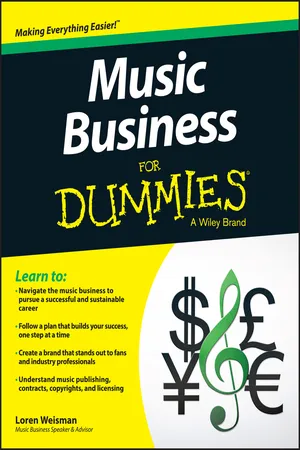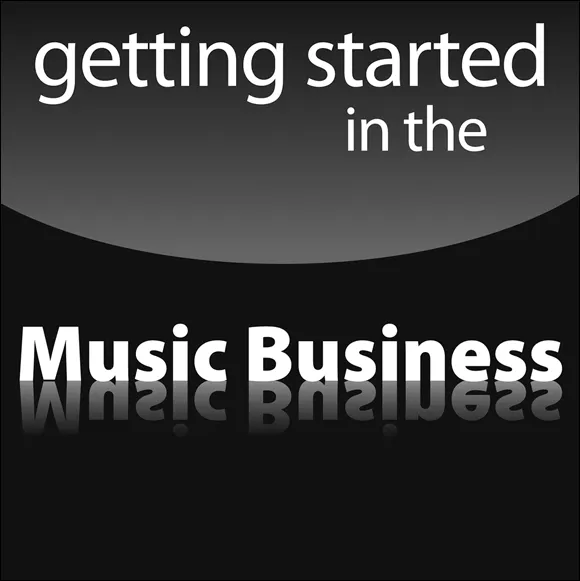
- English
- ePUB (mobile friendly)
- Available on iOS & Android
Music Business For Dummies
About this book
Start your music career off right with this fun guide to the music industry
Music Business For Dummies explains the ins and outs of the music industry for artists and business people just starting out. You'll learn how file-sharing, streaming, and iTunes have transformed the industry, and how to navigate your way through the new distribution models to capitalize on your work. It all begins with the right team, and this practical guide explains who you need to have on your side as you begin to grow and get more exposure. Coverage includes rehearsing, performing, recording, publishing, copyrights, royalties, and much more, giving you the information you need to start your career off smart.
Music industry success has never been easy to achieve, and recent transformations and disruptions to the business side have made the whole idea even more daunting than before. This guide gives you a roadmap around the landmines, and provides expert advice for starting out on the right foot.
- Find the right players, agents, and business managers
- Make more money from your work with smart distribution
- Build your brand and get people talking about you
- Get gigs, go on tour, and keep on growing
If music is your calling, you need to plan your career in a way that sets you up for success from the very beginning. Put the right people in place, get the most out of your investments, and learn how to work the crowd both virtually and in person. Music Business For Dummies is your companion on your journey to the music career you want.
Frequently asked questions
- Essential is ideal for learners and professionals who enjoy exploring a wide range of subjects. Access the Essential Library with 800,000+ trusted titles and best-sellers across business, personal growth, and the humanities. Includes unlimited reading time and Standard Read Aloud voice.
- Complete: Perfect for advanced learners and researchers needing full, unrestricted access. Unlock 1.4M+ books across hundreds of subjects, including academic and specialized titles. The Complete Plan also includes advanced features like Premium Read Aloud and Research Assistant.
Please note we cannot support devices running on iOS 13 and Android 7 or earlier. Learn more about using the app.
Information
Getting Started in the Music Business

- Learn the difference between the music and the music business, and discover how to separate the two to get a greater understanding of how they both work together.
- Understand recent changes in the music business and how they affect the industry as a whole.
- Examine all the different options — such as musician, recording engineer, manager, and more — to find the perfect fit for you.
- Learn about different options for funding your career, and how to create a music business plan to wow investors.
Getting on the Path to Results




Differentiating between the Music and the Music Business
Why you need to grasp the business
Understanding the basics of the music biz buffet
- Understanding and planning: Make sure everyone has a clear understanding of what each person is doing, what they’re getting, and how long they’re involved. Also make clear how monies are spent and how work is being done. I discuss more of this in Chapter 9.
- Protection and contractual obligation: This is where you and your legal team draw up and sign binding contracts that clarify each role and what each gains from revenues also discussed in Chapter 9.
- Problem solving and preventative maintenance: Make certain that you have an emergency preparedness and readiness plan in place and that you have solutions ready to resolve the issues. I go deeper into this in Chapter 18.
- Education and updating your learning: Stay up to date with new products, old contracts, and changes in the law for entertainment, intellectual property, and other related issues.
- Due diligence and fact checking: Before working with anyone or signing any agreement, making sure to verify your information, and check up on the people giving you that info before you go into business with them. From calling references to checking reviews and past clients, make sure the people you’re working with and the path they want to walk leads you where you want to go.
Disconnecting the business from the music
Practicing Responsible Career Tactics
Table of contents
- Cover
- Title Page
- Table of Contents
- Introduction
- Part I: Getting Started in the Music Business
- Part II: Making Music and Creating Your Brand
- Part III: Marketing and Promoting For the Long Haul
- Part IV: Maintaining Your Successful Career
- Part V: The Part of Tens
- About the Author
- Cheat Sheet
- Advertisement Page
- Connect with Dummies
- End User License Agreement

